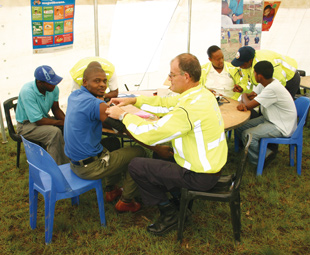Driver healthcare hits the road

Driver wellness has emerged at the forefront of many issues often swept under the carpet. Imagine a young family travelling to Durban on holiday with their new-born baby girl. An exhausted truck driver smashes into their car after falling asleep at the wheel, crushing the vehicle and, with it, the entire family. The baby’s grandparents have lost two beloved children and will never see their first grandchild take her first steps. The driver is permanently disabled. STUART MOIR attends the N3 Toll Concession’s (N3TC) Driver Wellness Day, which aims to help prevent just such a scenario.
Responsibility is a common word describing something a great many people surprisingly try to avoid. Yet, having assessed the alarming number of incidents that have taken place along the N3 toll route near Harrismith, the N3TC has come up with an event especially for long-haul truck drivers who all too often feel neglected and forgotten.
Fulfilling a need
And as Fikile Mphlenyone, eye-care coordinator for the Free State Health Department, highlights, the N3TC was spot-on in launching a campaign promoting driver wellness: “What is most alarming to health care workers is how few truck drivers know their HIV/Aids status,” she says. “This is disturbing, because these people are the backbone of our economy, so if they are sick we want to help. But most drivers don’t even know they’re infected until it’s too late!”
Sam Motshabi, the N3TC’s regional IMS manager, northern region, concurs. “It’s this type of awareness that we urge drivers and companies to take into consideration in order to improve the health of long-haul drivers in particular.”
The life of a long-distance truck driver is undoubtedly a lonely one. A typical driver will spend days – and sometimes weeks – away from his loved ones, and this void is often filled by the company of a sex worker. As a result, HIV/Aids thrives in this mobile population. Says Mphlenyone: “The low level of awareness about Aids among truck drivers is worrying, especially because so many have a highly negative attitude towards patients with Aids.” Consequently, the N3TC not only wants to draw attention to the different diseases drivers are at risk of contracting; but also to educate them on precautionary measures.
The Driver Wellness Day is intended to address more than just knowing your HIV status. The burgeoning number of truck and large vehicle accidents is a cause for considerable concern, so – rather than avoid the topic completely – the N3TC has chosen to challenge the crisis head on. “The majority of accidents taking place on our roads are human error-related. This is most commonly due to driver fatigue, which could have been caused by poor health such as bad eyesight, hypertension, and sugar levels amongst other conditions,” says Motshabi.
In South Africa, close to 70% of goods are carried to their destination by road freight transport operators, so drivers play an important role in freight delivery. Which is why the N3TC has introduced the Driver Wellness Day as a regular event. “The motivation behind this event was not only to address health and wellness issues directly with the drivers themselves, but also to raise awareness of the critical importance of health-related factors on a driver’s ability to complete a journey safely,” explains Miles le Roux, N3TC transportation manager.
Helping hand
According to Michelle Steyn, project coordinator at Corridor Empowerment, the need to bring services to this target audience while on the road to various destinations has always been there. “It’s important that truck drivers take these projects seriously, as an efficient transport system is critical for any economy to flourish,” she maintains. And while commercial vehicle drivers require intense professional training and a high level of skill, health factors are often forced to take a back seat.
 Commercial manager of N3TC, Con Roux, elaborates. “We’re finding that an increasing number of health issues are impacting on truck driver performance. One is sleep apnoea (sleep deprivation). While drivers are aware of how important sleep is in terms of affecting job performance, because they are given performance-based bonuses they often push themselves beyond their physical capabilities in the hope of receiving a bigger monetary reward,” he says.
Commercial manager of N3TC, Con Roux, elaborates. “We’re finding that an increasing number of health issues are impacting on truck driver performance. One is sleep apnoea (sleep deprivation). While drivers are aware of how important sleep is in terms of affecting job performance, because they are given performance-based bonuses they often push themselves beyond their physical capabilities in the hope of receiving a bigger monetary reward,” he says.
“Road safety should be everyone’s priority,” Motshabi insists. “Accidents resulting in serious injuries and fatalities have a detrimental effect on the economy and we certainly believe that prevention is far better than cure; and definitely more cost effective.” But the aim of each Driver Wellness Day is also to build a relationship of trust between drivers and law enforcement officers. Motshabi explains: “We use traffic officials to inform truck drivers travelling along the N3 to stop for their free medical checks in order to open up a path of communication and instil a level of cooperation and inter-dependence between truck drivers and the police.”
Operators can contribute towards improving safety on our roads by encouraging their drivers to support the event. “This is the first intervention of its kind to take place along the Free State section of the N3 toll route,” says Con Roux. But the success of such an event is determined by those willing to help, and Steyn believes that – through strong partnerships and all-round collaboration – the most recent Driver Wellness Day was a major success.
The N3TC is planning to host a number of additional Driver Wellness Days in time to come. “These events will supplement the many wellness centres across the country that provide regular services to truck drivers,” concludes Steyn.
Published by
Focus on Transport
focusmagsa



 !
From 1 Apri
!
From 1 Apri

 Big news from FOCUS on Transport + Logist
Big news from FOCUS on Transport + Logist





 FUSO: Driving the Future of Mobile Healthc
FUSO: Driving the Future of Mobile Healthc



 A brand
A brand




 Wondering about the maximum legal load for a
Wondering about the maximum legal load for a 
 The MAN hTGX powered by a hydrogen combus
The MAN hTGX powered by a hydrogen combus

 Exciting News for South African Operators
Exciting News for South African Operators
